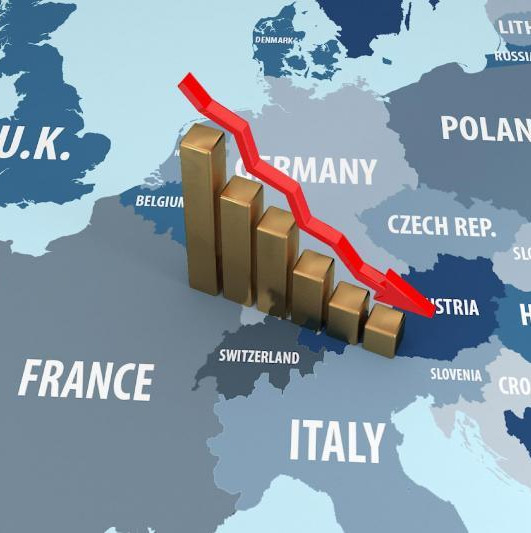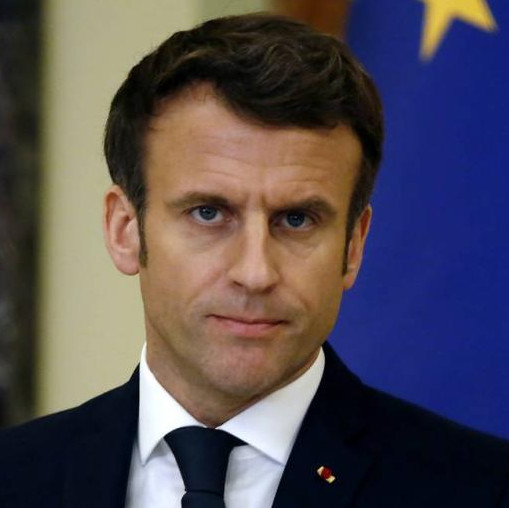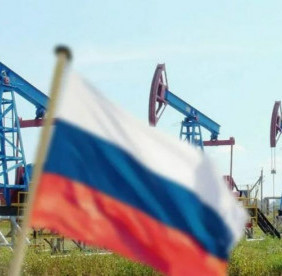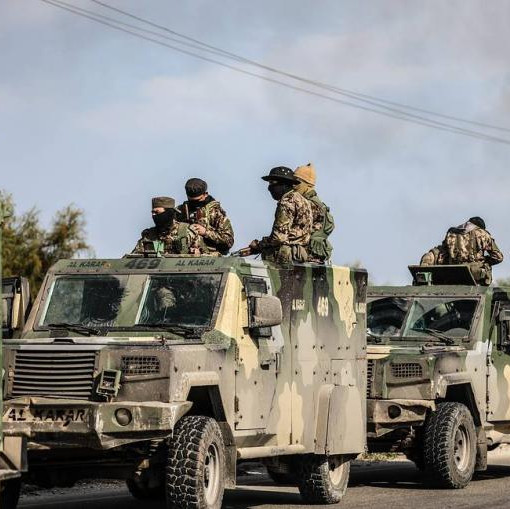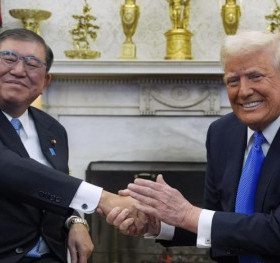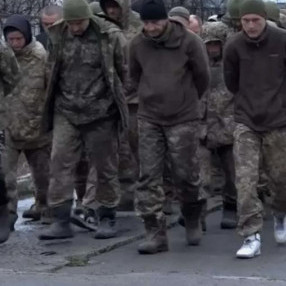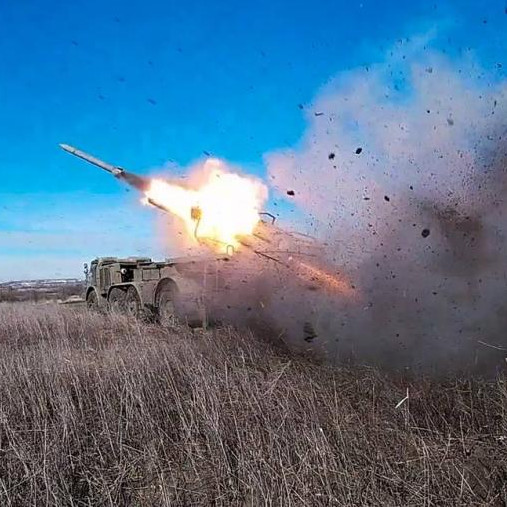
Vladimir Putin welcomes the outcome of the Russia-US talks in Riyadh; the EU greenlights another package of sanctions on Russia; and the US in no rush to return to the nuclear deal with Tehran. These stories have topped Thursday’s newspaper headlines across Russia, according to TASS news agency.
Media: Putin assesses outcome of Russia-US talks in Riyadh
On February 19, Russian President Vladimir Putin for the first time thoroughly commented on the outcome of the Russian-US talks held in the Saudi capital of Riyadh. Putin hailed the negotiations as "they produced results," Vedomosti notes.
There is great demand for the resumption of cooperation and the revival of relations between Russia and the United States, as ties are currently at a low point Denis Denisov, an expert at the Financial University under the Government of the Russian Federation, observed.
Putin’s praise for the Riyadh talks makes it clear that communication will continue, Russia in Global Affairs Editor-in-Chief Fyodor Lukyanov said. For a start, the parties will bring the operation of their diplomatic missions back to normal before launching preparations for a meeting between the two countries’ presidents. According to the expert, the negotiation process will progress, including on the Ukraine issue, but it’s not yet about a direct conversation between Russia and Ukraine. In Lukyanov’s view, it will depend on what the US is ready to offer Kiev and what it will expect from Ukraine.
As of today, we can talk at least about the resumption of a substantive dialogue between Russia and the US, Andrey Kortunov, research director of the Russian International Affairs Council, pointed out. He specified that relations could be restored at various levels, including the revival of communication channels and the operation of diplomatic missions. "Basically, all this is very important in terms of the overall restoration efforts," the expert stressed. According to Kortunov, further progress depends on the political will the parties may show. In particular, progress in the current efforts will depend on whether the parties manage to reach an understanding on settling the Ukraine conflict, the analyst emphasized.
Meanwhile, Kiev still hopes to get military assistance from Europe if Washington eventually drops support for Ukraine, Izvestia writes. This raises questions about whether officials from London and Brussels will be engaged in talks. The Europeans continue to employ belligerent rhetoric and are even considering the option of sending troops to Ukraine. It’s Russia-US consultations that will form the basis for the entire negotiation process, Kortunov concluded.
Media: EU approves additional sanctions on Russia
European Union envoys have approved the 16th package of restrictions on Russia. According to Western reports, as expected, the focus will be on a ban on Russian raw aluminum imports. The industry’s companies resisted the initiative to include an aluminum ban in the previous 15 packages of sanctions.
Additionally, according to media leaks, the new package will also cut off another 13 Russian banks from the SWIFT payment system, blacklist 73 more tankers on top of the 79 already on the list, and impose restrictions on several ports and airports, Vedomosti writes.
Top EU diplomat Kaja Kallas did not rule out in January that Russian liquefied natural gas (LNG) imports would also be restricted, but the new package does not mention such sanctions. According to Kpler estimates, Russian LNG supplies to the EU reached 33.6 million metric tons in 2024, the highest level since 2022. Igor Yushkov, an expert at the Financial University under the Government of the Russian Federation, believes that it’s Hungary and Slovakia that oppose restrictions on LNG imports. He added that apart from LNG, few other targets remain for sanctions.
US restrictions are heavier than those of the EU as they are extraterritorial and could trigger blocking sanctions for all those in contact with sanctioned individuals and companies, Yushkov points out. Brussels’ principle is different: EU officials continue to duplicate US restrictions, only to a lesser extent. The question of whether the EU will introduce more sanctions is settled: the process will go on, Russian International Affairs Council Director General Ivan Timofeev agrees.
Nadezhda Arbatova, head of the Department of European Political Studies at the Russian Academy of Sciences’ Institute of World Economy and International Relations, told Nezavisimaya Gazeta that there was nothing extraordinary about the EU’s move to approve the newest package of sanctions.
"A new package was expected. What stands out is the international political situation in which the EU leadership is introducing sanctions. After US Vice President JD Vance shocked European leaders with his harsh criticism in an address to the Munich Security Conference, Brussels seeks to show Washington that it will make independent decisions on security issues and sanctions against Russia, without waiting for the Donald Trump administration," the analyst explained.
The EU’s new measures stem from Brussels' concerns that Trump could reduce the pressure of sanctions on Moscow as part of the communication process that has begun between the US and Russian presidents. "Apparently, by adopting the new package of sanctions, the EU authorities seek not only to increase pressure on Moscow but also to remind Washington that restrictions against Russia were agreed on by the Group of Seven," Arbatova said. "Brussels believes that the United States’ unilateral withdrawal from the process will harm the West’s unity amid a deep crisis facing European security," she added.
Izvestia: US not rushing to return to nuclear deal with Tehran
The new US administration has not yet shown any interest in reviving the Iran nuclear deal, Russian Ambassador to Tehran Alexey Dedov told Izvestia.
The future of the nuclear deal is still uncertain, largely because of the United States' position. "In my view, there is still much left to be done here. Western countries continue to strongly oppose normalizing relations with Iran in this area as they have failed to show any constructive approach," Dedov noted. "The trend of the United States adopting a harsher stance towards Iran has become clear recently, which is why it’s difficult to make any predictions at this moment about the prospects of this particular aspect," he added.
On February 4, US President Donald Trump signed a document on restoring maximum pressure on Iran. In particular, Washington aims to reduce Iran’s oil exports. On February 10, the US leader stated that Tehran’s nuclear program could be halted either by military means or through an agreement. However, the West’s policy of sanctions remains the main barrier preventing the resumption of the nuclear deal. Washington is in no rush to reduce pressure on Iran.
"Actually, the US president has employed a classic political method based on the carrot-and-stick approach. In fact, he has issued an ultimatum to Tehran: you either accept a deal on our terms or we will torture you with strict sanctions, with the likelihood being that military force will be used," Vladimir Sazhin, a researcher at the Russian Academy of Sciences’ Institute of Oriental Studies, explained.
Notably, talks between Iran and the European trio (the UK, Germany, and France) resumed in Geneva in late November 2024. The European nations were interested in reviving the agreement. Now, it is more relevant than ever because the lifting of sanctions on Iran would allow the EU to compensate for the lack of hydrocarbons, primarily oil, which has been exacerbated by sanctions against Russia. However, this doesn’t mean that European countries are interested in restoring relations with Iran.
Izvestia: Europe aims to maintain its position on the international stage
Kiev’s European allies have failed to establish a unified stance on the deployment of troops to Ukraine. Another round of talks between European leaders, hosted by France, has ended without any outcome, Izvestia reports.
The second Paris meeting on Ukraine (the first one took place on February 17) turned out to be the French president’s video conference meeting with the leaders of Canada, Belgium, Finland, Sweden, Cyprus, Iceland, Portugal, Slovenia, Romania, Luxembourg, and the Baltic nations. Only the acting Romanian president and the prime minister of Luxembourg participated in person. The Lithuanian president stated after the meeting that no decision had been reached on sending peacekeepers to Ukraine. Meanwhile, French President Emmanuel Macron has altered the tone of his statements. He did not rule out the possibility of talks with Russian leader Vladimir Putin. However, a Kremlin source told Izvestia that the Elysee Palace had not yet made any requests for communication.
Macron is highly contradictory in his statements, so it’s likely that he will alter his position in the future, French political scientist Nikola Mirkovic said. According to him, in the current situation, Macron realizes that France and Kiev’s supporters have no means to continue the conflict if the US stops financing it.
Putin and Trump are making it clear that they are unwilling to engage with the European Union because it has lost its credibility in negotiations, and the leaders who have held prominent positions in Europe in recent years haven’t done anything to foster peace, Mirkovic noted. The expert points out that the EU is a prisoner of its own ideas and has completely lost touch with reality, which is why it cannot understand what to do.
Attempts by Macron and EU allies to formulate a clear solution for Ukraine will fail repeatedly, French geopolitical analyst Cyrille de Lattre observed. In the expert’s view, the European Union’s move to increase spending on Ukraine and NATO would serve Washington’s interests. The US is well aware that the EU is unable to bear such a financial burden, and it will eventually lead to the union’s collapse. The US does not need a Europe that cannot defend itself; Washington would prefer to see Europe divided and torn by contradictions, the analyst concluded.
Rossiyskaya Gazeta: Foreign IT companies unlikely to receive warm reception back to Russia
Foreign IT companies may want to return to Russia after some sanctions are lifted but Russia’s domestic legal restrictions on the use of software from unfriendly countries are unlikely to be removed, said experts interviewed by Rossiyskaya Gazeta.
"Unfriendly countries may start to lift certain bans on the operation of their vendors in Russia and those may want to return to the Russian market. However, they won’t be able to avoid our legal restrictions. They won’t have access to government-owned companies and critical information infrastructure facilities. Private businesses will also remember their shameful withdrawal from Russia and will penalize them for ending prepaid support," said Nikolay Komlev, director of the Association of Computer and Information Technologies and chairman of the Council for the Development of Digital Economy at the Russian Chamber of Industry and Commerce. The expert points out that Western investors, trading platforms and manufacturers of consumer software and appliances are most likely to be the first to try to return to the Russian market.
"Russia’s IT sector made much progress in the absence of major Western players. Our companies quickly occupied the vacant niche, offering competitive alternatives to popular Western solutions. In particular, MyOffice is now widely used instead of Microsoft Office, RuStore has replaced Google Play, and Russian platforms such as Yandex Oblako, VK Cloud and some others are being promoted as alternatives to foreign-designed cloud solutions. This factor will not only complicate Western companies’ return to Russia but it will also make it economically irrational because they would have to reconquer the market that has adapted to the new situation," State Duma (lower house of parliament) member Andon Nemkin said.
However, experts doubt that it’s possible to seriously talk about Russia banning the import of the best software and hardware and unfriendly countries lifting restrictions on the supplies of certain components of critical technologies to Russia.
TASS is not responsible for the material quoted in these press reviews
